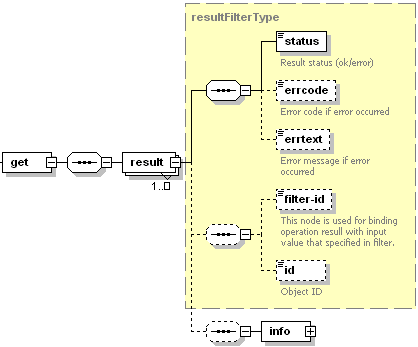Retrieving Information on Site Aliases
The get operation is used to retrieve info on site aliases from Plesk database that includes the following parameters:
- Site alias preferences
- Primary site id and name
Request Packet Structure
A request XML packet retrieving a site alias settings from Plesk database includes the get operation node:
<packet>
<site-alias>
<get>
...
</get>
</site-alias>
</packet>
The get node graphical representation is as follows:

Note: The interactive schema navigator for all request packets is available here: http://plesk.github.io/api-schemas/1.6.9.1/agent_input.svg.
- The filter node is required. It specifies the filtering rule.
For information on filters, refer to the Available
Filters section. Data type: domainAliasFilterType
(
domainalias_input.xsd).
Response Packet Structure
The get node of the output XML packet is structured as follows:

Note: The interactive schema navigator for all response packets is available here: http://plesk.github.io/api-schemas/1.6.9.1/agent_output.svg.
- The result node is required. It wraps the response received
from the server. Data type: resultFilterType (
common.xsd).
Note: The node is required. Specifies the execution status of the get operation. Data type: string. Allowed values: ok | error.
- The errcode node is optional. Is used to return the error code when the get operation fails. Data type: unsignedInt.
- The errtext node is optional. Can be used to return the error message if the get operation fails. Data type: string.
- The id node is optional. It returns the site alias id; it is required if the get operation has succeeded or if this id was specified in the request packet. Data type: integer.
- The filter-id node is optional. It returns a filtering rule parameter. For more information, refer to the Available Filters section. Data type: anySimple.
- The info node is optional. It is present if the get
operation succeeds and contains the alias preferences. For more
information, refer to the Site Alias Settings
section. Data type: AliasInfoType (
plesk_domainalias.xsd) .
Retrieving settings of a single site alias
This packet retrieves preferences of the site alias called MyAlias.com.
<packet>
<site-alias>
<get>
<filter>
<name>MyAlias.com</name>
</filter>
</get>
</site-alias>
</packet>
A positive response received from the server after retrieving info on the site alias can look as follows:
<packet>
<site-alias>
<get>
<result>
<status>ok</status>
<info>
<prefs>
<web>true</web>
<mail>false</mail>
<tomcat>false</tomcat>
</prefs>
<site-id>3</site-id>
<name>MyAlias.com</name>
<ascii-name>MyAlias.com</ascii-name>
</info>
</result>
</get>
</site-alias>
</packet>
Retrieving settings of multiple site aliases
This packet retrieves preferences of the site aliases called MyAlias.com and MySecondAlias.com.
<packet>
<site-alias>
<get>
<filter>
<name>MyAlias.com</name>
<name>MySecondAlias.com</name>
</filter>
</get>
</site-alias>
</packet>
A positive response got from the server can look as follows (two site aliases exist for this site name):
<packet>
<site-alias>
<get>
<result>
<status>ok</status>
<info>
<prefs>
<web>false</web>
<mail>false</mail>
<tomcat>false</tomcat>
</prefs>
<site-id>3</site-id>
<name>MyAlias.com</name>
<ascii-name>MyAlias.com</ascii-name>
</info>
</result>
<result>
<status>ok</status>
<info>
<prefs>
<web>true</web>
<mail>false</mail>
<tomcat>false</tomcat>
</prefs>
<site-id>3</site-id>
<name>My2Alias.com</name>
<ascii-name>My2Alias.com</ascii-name>
</info>
</result>
</get>
</site-alias>
</packet>
The following packet is wrong because both name and site-id are used for identification.
<packet>
<site-alias>
<get>
<filter>
<name>MyAlias.com</name>
<site-id>12</site-id>
</filter>
</get>
</site-alias>
</packet>
This packet retrieves preferences of all site aliases on the server.
<packet>
<site-alias>
<get>
<filter/>
</get>
</site-alias>
</packet>